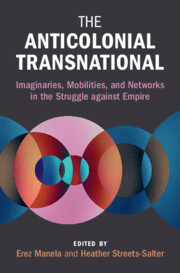Book contents
- The Anticolonial Transnational
- Global and International History
- The Anticolonial Transnational
- Copyright page
- Contents
- Figures
- Contributors
- Acknowledgments
- 1 Introduction
- Part I The Many Anticolonial Transnationals
- 2 Philippine Asianist Thought and Pan-Asianist Action at the Turn of the Twentieth Century
- 3 All Empires Must Fall: International Proletarian Revolution and the Anticolonial Cause in British India
- 4 Indoamerica against Empire: Radical Transnational Politics in Mexico City, 1925–1929
- 5 Carlos Romulo, Rotary Internationalism, and Conservative Anticolonialism
- Part II Solidarities and Their Discontents
- Part III Anticolonialism in a Postcolonial Age
- Index
2 - Philippine Asianist Thought and Pan-Asianist Action at the Turn of the Twentieth Century
from Part I - The Many Anticolonial Transnationals
Published online by Cambridge University Press: 10 August 2023
- The Anticolonial Transnational
- Global and International History
- The Anticolonial Transnational
- Copyright page
- Contents
- Figures
- Contributors
- Acknowledgments
- 1 Introduction
- Part I The Many Anticolonial Transnationals
- 2 Philippine Asianist Thought and Pan-Asianist Action at the Turn of the Twentieth Century
- 3 All Empires Must Fall: International Proletarian Revolution and the Anticolonial Cause in British India
- 4 Indoamerica against Empire: Radical Transnational Politics in Mexico City, 1925–1929
- 5 Carlos Romulo, Rotary Internationalism, and Conservative Anticolonialism
- Part II Solidarities and Their Discontents
- Part III Anticolonialism in a Postcolonial Age
- Index
Summary
This article excavates the Philippine nation’s cosmopolitan and transnational Asian intellectual moorings, in order to reconnect Philippine history to that of Southeast Asia, from which it has been historiographically separated. It argues that turn-of-the-twentieth-century Philippine Asianism was crucial to the concept of the Filipino nation that the ilustrados (educated elite) constructed, to the ilustrado-led Propaganda Movement’s political argumentation against Spain, and to the political mobilization and organizing of the Katipunan and the First Philippine Republic. It incorporates the “periphery” into our understanding of Pan-Asianism to correct our exclusively intellectual historical and Northeast-Asia-centric understandings of Pan-Asianism. It shows that the revolutionary First Philippine Republic’s foreign collaboration represents the first instance of fellow Pan-Asianists lending material aid toward anticolonial revolution against a Western power (rather than overthrow of a domestic dynasty) and harnessing transnational Pan-Asian networks of support, activism, and association toward doing so.
- Type
- Chapter
- Information
- The Anticolonial TransnationalImaginaries, Mobilities, and Networks in the Struggle against Empire, pp. 19 - 40Publisher: Cambridge University PressPrint publication year: 2023
- 1
- Cited by

